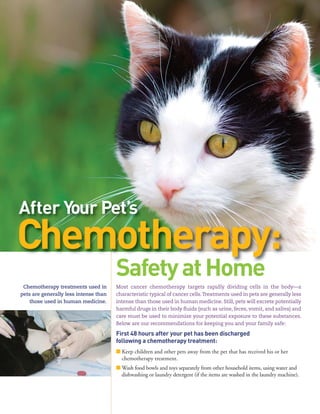Chemotherapy handout for pets
- 1. After Your PetŌĆÖs Chemotherapy treatments used in pets are generally less intense than those used in human medicine. Most cancer chemotherapy targets rapidly dividing cells in the bodyŌĆöa characteristic typical of cancer cells.Treatments used in pets are generally less intense than those used in human medicine. Still, pets will excrete potentially harmful drugs in their body fluids (such as urine, feces, vomit, and saliva) and care must be used to minimize your potential exposure to these substances. Below are our recommendations for keeping you and your family safe: First 48 hours after your pet has been discharged following a chemotherapy treatment: Ō¢Ā Keep children and other pets away from the pet that has received his or her chemotherapy treatment. Ō¢Ā Wash food bowls and toys separately from other household items, using water and dishwashing or laundry detergent (if the items are washed in the laundry machine). Chemotherapy: SafetyatHome
- 2. Ō¢Ā Wash bedding separately from other laundry using laundry detergent and bleach if fecal-soiled. Repeat an empty washing cycle before using the machine for your usual laundry items. Ō¢Ā Use latex gloves when cleaning up urine, feces, or other body fluids: ŌĆō The thicker the glove, the better. You may also double glove (use one pair of gloves on top of another). Nitrile gloves may also be used, but latex is preferred when possible. ŌĆō Dispose of gloves in the trash; trash should be double-bagged. ŌĆō Always wash hands after removing and disposing used gloves. Ō¢Ā Clean up feces, urine, and/or vomit (wearing gloves), and dispose properly: ŌĆō Solid/semi-solid waste (feces/vomit) and small amounts of absorbent material (such as toilet paper or paper towels with urine) may be flushed down the toilet. ŌĆō Larger amounts of waste should be disposed of in your regular trash. Double bag the trash bags. Ō¢Ā Encourage dogs to urinate on grass, in an area away from where other pets normally eliminate. Having your pet urinate on grass rather than concrete (or other solid surface) will eliminate the needto hose the area down. Using a hose increases the possibility of contaminated fluids splashing on people in the vicinity. Ō¢Ā If there is an ŌĆ£accidentŌĆØ in the house (such as urinating or vomiting): ŌĆō Try to contain and absorb the fluid by blotting with paper towels (that can then be double-bagged and thrown away). ŌĆō After cleaning the area, disinfect it with household bleach (1 part bleach to 10 parts water) Some chemotherapy drugs remain in body fluids longer than 48 to 72 hours. Please consult with your veterinarian regarding specific drugs. cliniciansbrief.com/ for-your-clinic/100 Ō¢Ā For cats: ŌĆō Clean litter trays regularly. Disinfect the litter pan 72 hours after the chemotherapy treatment. ŌĆō Consider using a litter pan liner or disposable litter tray. Special Conditions: For the following people, it is preferable NOT to handle animals or their body fluids for 72 hours after the petŌĆÖs chemotherapy treatment: Ō¢Ā Those trying to become pregnanty (both men and women) Ō¢Ā Breastfeeding mothers Ō¢Ā Immunosuppressed people (such as very ill people or those with immune disorders) Ō¢Ā People taking immunosuppressive medications (such as people receiving treatment for cancer or an immune disorder) Some chemotherapy drugs remain in body fluids longer than 48 to 72 hours. Please consult with your veterinarian regarding specific drugs. Some dogs have ŌĆ£pica,ŌĆØ a behavior of ingesting nonfood items such as dog/cat feces. Housemates of pets undergoing chemotherapy should be monitored for this behavior and steps should be taken to minimize opportunity (eg, place cat litter box on raised surface out of dogŌĆÖs reach). If you have any questions regarding your pet, please call us at: _____________________________ If you have any questions regarding your health or potential exposure to your pet after chemotherapy, please contact your physician.


